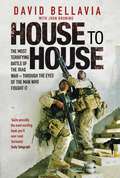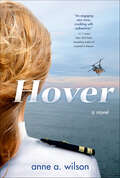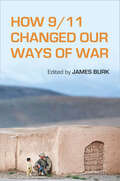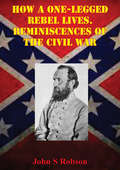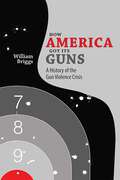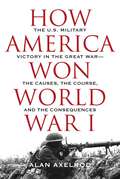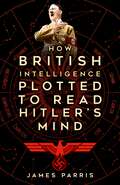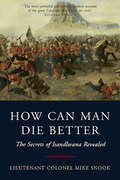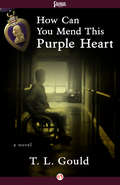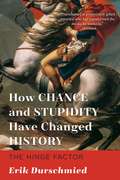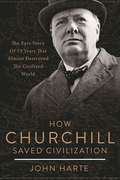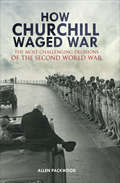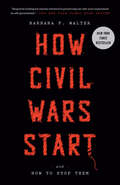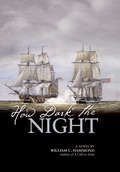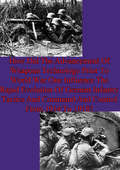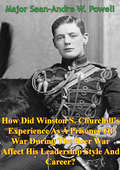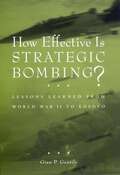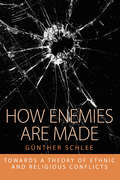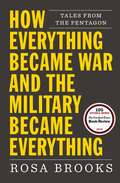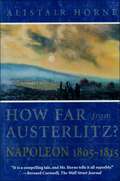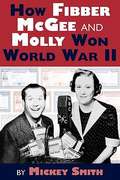- Table View
- List View
House to House: A Tale of Modern War
by John R. Bruning David BellaviaBringing to searing life the terrifying intimacy of hand-to-hand infantry combat, House to House is far more than just another war story. Populated by an indelibly drawn cast of characters, it develops the intensely close relationships that form between soldiers under fire. Their friendships, tested in brutal combat, would never be quite the same. What happened to them in their bloody embrace with America's most implacable enemy is a harrowing, unforgettable story of triumph, tragedy, and the resiliency of the human spirit. House to House is a soldier's memoir that is destined to rank with the finest personal accounts of men at war. An instant classic in hardcover, this timeless story features a new afterword and a question and answer section with the author.
House to House: A Tale of Modern War
by David Bellavia John BruningOn 8 November 2004, the largest battle of the War on Terror began, with the US Army's assault on Fallujah and its network of tens of thousands of insurgents hiding in fortified bunkers, on rooftops, and inside booby-trapped houses. For Sgt. David Bellavia of 3rd Platoon, Alpha Company, it quickly turned into a battle on foot, from street to street and house to house. On the second day, he and his men laid siege to a mosque, only to be driven to a rooftop and surrounded, before heavy artillery could smash through to rescue them. By the third day, Bellavia charges an insurgent-filled house and finds himself trapped with six enemy fighters. One by one, he shoots, wrestles, stabs, and kills five of them, until his men arrive to take care of the final target. It is one of the most hair-raising battle stories of any age -- yet it does not spell the end of Bellavia's service. It would take serveral more weeks before the Battle of Fallujah finally came to a close, with Bellavia, miraculously, alive. In the words of the author: "HOUSE TO HOUSE holds nothing back. It is a raw, gritty look at killing and combat and how men react to it. It is gut-wrenching, shocking and brutal. It is honest. It is not a glorification of war. Yet it will not shy from acknowledging this: sometimes it takes something as terrible as war for the full beauty of the human spirit to emerge."
House to House: An Epic Memoir of War
by Sgt. David BellaviaTHE CLASSIC SOLDIER&’S MEMOIR FROM MEDAL OF HONOR RECIPIENT STAFF SERGEANT DAVID BELLAVIA &“A rare and gripping account of frontline combat.&”—LTG (Ret.) H.R. McMaster, author of Dereliction of Duty &“They used to say that the real war will never get in the books. Here it does, stunningly.&” —Thomas E. Ricks, author of Fiasco: The American Military Adventure in Iraq and Making the Corps &“To read this book is to know intimately the daily grind and danger of men at war.&”—Anthony Swofford, New York Times bestselling author of JarheadOne of the great heroes of the Iraq War, Staff Sergeant David Bellavia captures the brutal action and raw intensity of leading his Third Platoon, Alpha Company, into a lethally choreographed kill zone: the booby-trapped, explosive-laden houses of Fallujah's militant insurgents. Bringing to searing life the terrifying intimacy of hand-to-hand infantry combat, this stunning war memoir features an indelibly drawn cast of characters, not all of whom would make it out alive, as well as the chilling account of the singular courage that earned Bellavia the Medal of Honor: Entering one house alone, he used every weapon at his disposal in the fight of his life against America's most implacable enemy. Bellavia has written an unforgettable story of triumph, tragedy, and the resilience of the human spirit.
Hover: A Novel
by Anne A. Wilson“A memorable heroine thrown into a unique, exhilarating setting with an equally heart-pounding love interest. . . . thrilling, romantic, [and] cinematic.” —Michelle Gable, New York Times–bestselling author of A Paris ApartmentHelicopter pilot Lt. Sara Denning steps into her brother’s shoes after his tragic death and joins a navy battle group, despite her fear of water. Sara’s philosophy is simple—blend in, be competent, and above all, never do anything to stand out as a woman in a man’s world.Somewhere along the way, Sara lost herself—her feminine, easygoing soul is now buried under so many defensive layers, she can’t reach it anymore.When she meets strong, self-assured Lt. Eric Marxen, her defenses start to falter. Eric coordinates flight operations for a Navy SEAL team that requests Sara as the exclusive pilot. This blatant show of favoritism causes conflict with the other pilots. It doesn’t help that her interactions with Eric leave her reeling.Soon the training missions become real, and Sara must overcome her fears before they plunge her into danger. When Sara’s life is on the line, can she find her true self again and follow the orders of her heart before it is too late?Anne A. Wilson’s Hover is a thrilling, emotional women’s journey written by a groundbreaking former navy pilot.“An engaging new voice, crackling with authenticity.” —CJ Lyons, New York Times–bestselling author of Farewell to Dreams“Wilson offers a must-read that merges suspense, intrigue, and romance in a dynamic setting.” —Library Journal“Tightly written training scenes make for a smart, absorbing thriller.” —Kirkus Reviews“Wilson’s experience as an active-duty U.S. Navy helicopter pilot brings a nuanced perspective to her thrilling debut.” —Booklist
How 9/11 Changed Our Ways of War
by James BurkFollowing the 9/11 attacks, a war against al Qaeda by the U. S. and its liberal democratic allies was next to inevitable. But what kind of war would it be, how would it be fought, for how long, and what would it cost in lives and money? None of this was known at the time. What came to be known was that the old ways of war must changeOCobut how? Now, with over a decade of political decision-making and warfighting to analyze, "How 9/11 Changed Our Ways of War" addresses that question. In particular it assesses how well those ways of war, adapted to fight terrorism, affect our military capacity to protect "and" sustain liberal democratic values. The book pursues three themes: what shaped the strategic choice to go to war; what force was used to wage the war; and what resources were needed to carry on the fight? In each case, military effectiveness required new and strict limits on the justification, use, and support of force. How to identify and observe these limits is a matter debated by the various contributors. Their debate raises questions about waging future warsOCoincluding how to defend against and control the use of drones, cyber warfare, and targeted assassinations. The contributors include historians, political scientists, and sociologists; both academics and practitioners. "
How A One-Legged Rebel Lives. Reminiscences Of The Civil War: The Story Of The Campaigns Of Stonewall Jackson, Told By A High Private In The “Foot Cavalry”
by John S RobsonA veteran of the 52nd Virginia Regiment recounts his experiences under the great Stonewall Jackson in his Valley campaign and up until he lost his leg for the Southern cause at the battle of Cedar Creek.
How America Got Its Guns: A History of the Gun Violence Crisis
by William BriggsIn the United States more than thirty thousand deaths each year can be attributed to firearms. This book on the history of guns in America examines the Second Amendment and the laws and court cases it has spawned. The author&’s thorough and objective account shows the complexities of the issue, which are so often reduced to bumper-sticker slogans, and suggests ways in which gun violence in this country can be reduced.Briggs profiles not only protagonists in the national gun debate but also ordinary people, showing the ways guns have become part of the lives of many Americans. Among them are gays and lesbians, women, competitive trapshooters, people in the gun-rights and gun-control trenches, the NRA&’s first female president, and the most successful gunsmith in American history.Balanced and painstakingly unbiased, Briggs&’s account provides the background needed to follow gun politics in America and to understand the gun culture in which we are likely to live for the foreseeable future.
How America Won World War I
by Alan AxelrodImmediately after the armistice was signed in November, 1918, an American journalist asked Paul von Hindenburg who won the war against Germany. He was the chief of the German General Staff, co-architect with Erich Ludendorff of Germany&’s Eastern Front victories and its nearly war-winning Western Front offensives, and he did not hesitate in his answer. &“The American infantry,&” he said. He made it even more specific, telling the reporter that the final death blow for Germany was delivered by &“the American infantry in the Argonne.&” The British and the French often denigrated the American contribution to the war, but they had begged for US entry into the conflict, and their stake in America&’s victory was, if anything, even greater than that of the United States itself. But How America Won WWI will not litigate the points of view of Britain and France. The book will accepts as gospel the assessment of the top German leader whose job it had been to oppose the Americans directly - that the American infantry won the war - and this book will tell how the American infantry did it.
How British Intelligence Plotted to Read Hitler's Mind: How British Intelligence Plotted to Read Hitler's Mind
by James ParrisIn the darkest days of the Second World War, as Europe fell under Nazi domination and Britain faced invasion, Louis de Wohl, a 36-year-old refugee from Germany, made a curious offer to British Intelligence. Based on the widely held belief that Hitler’s every action was guided by his horoscope, de Wohl claimed he could reveal precisely what advice the Führer’s astrologers were giving him.Rather than dismissing de Wohl out of hand as a crank, senior intelligence officers and chiefs of staff of the three armed services took him at his word. De Wohl was made an army captain and quartered in the Grosvenor House Hotel, from where his one-man ‘Psychological Research Bureau’ passed astrological readings and assessments to the War Office, before his deployment to the United States by the highly secret Special Operations Executive on a propaganda mission.Was it possible that Military and Naval intelligence officers could take the ancient and arcane practice of astrology seriously? Was de Wohl genuine or merely a charlatan? Did his astrological readings contribute to the downfall of Hitler and Nazi Germany?In How British Intelligence Plotted to Read Hitler’s Mind, the first fulllength study of Louis de Wohl, James Parris examines the evidence – including material from MI5, Military and Naval Intelligence files at the National Archives – and reaches remarkable conclusions about this bizarre aspect of the Second World War.
How Can Burundi Raise Its Growth Rate?
by Olivier BasdevantA report from the International Monetary Fund.
How Can Man Die Better: The Secrets of Isandlwana Revealed
by Mike SnookWednesday 22 January 1879 was one of the most dramatic days in the long and distinguished history of the British Army. At noon a massive Zulu host attacked the 24th Regiment in its encampment at the foot of the mountain of Isandlwana, a distinctive feature that bore an eerie resemblance to the Sphinx badge of the outnumbered redcoats. Disaster ensued. Later that afternoon the victorious Zulus would strike the tiny British garrison at Rorkes Drift. How Can Man Die Better is a unique analysis of Isandlwana of the weapons, tactics, ground, and the intriguing characters who made the key military decisions. Because the fatal loss was so high on the British side there is still much that is unknown about the battle. This is a work of unparalleled depth, which eschews the commonly held perception that the British collapse was sudden and that the 24th Regiment was quickly overwhelmed. Rather, there was a protracted and heroic defence against a determined and equally heroic foe. The author reconstructs the final phase of the battle in a way that has never been attempted before. It was to become the stuff of legend, which brings to life so vividly the fear and smell the blood.
How Can You Mend This Purple Heart
by T. L. GouldWinner of the Marine Corps Heritage Foundation's James Webb Award for distinguished fiction In this riveting first novel, author T. L. Gould draws on his experiences in a military hospital with severely wounded Marines recovering from the Vietnam War. He has created a plain-truth, no-holds-barred narrative, stark in its simplicity, detail, and humor. From dressing changes and morphine drips to off-site forays under a fence and into neighborhood bars and brothels, Gould chronicles the precipitous journey to recovery of the men of Ward 2B: how they learned to walk again, to love again, and to triumph over crippling injuries. How Can You Mend This Purple Heart is not a story about combat in the jungles of Vietnam. It is a story about boys who returned from combat as men--men who left the better part of their youth, a bit of their souls, and a lot of their flesh in a battlefield on the other side of the world. It's a story about their longing to recapture the spirit of boyhood and rekindle the optimism and fearlessness of youth. And it's about their struggle to be whole again--or at the very least, to feel whole. It chronicles a journey of love, redemption, sorrow, and joy; a journey of pain and anger . . . and a journey of hope. But most of all, a journey of the human spirit and its triumph over the most impossible odds. How Can You Mend This Purple Heart is a tribute to all the combat-wounded veterans of past and present conflicts. May they find the strength to continue their lives' missions and know that the entire nation is grateful for their sacrifices.
How Chance and Stupidity Have Changed History: The Hinge Factor
by Erik DurschmiedFrom the Trojan Horse to a photograph snapped in Vietnam, world history has been shaped as much by chance and error as by courage and heroism. Despite impossible odds, invincible armies fall in bitter defeat to weaker opponents. How and why does this happen? What decides the fate of battle? In this fascinating book, Erik Durschmied takes us through the major conflicts of history-from Agincourt to the Civil War, from Crimea to the Gulf War-and reveals how, in war, it is the improbable and the inconceivable that determine events.Writing with the style and flair that made him an award-winning war correspondent, Durschmied explores the fistful of nails that could have won Waterloo for Napoleon; the barrel of schnapps that proved disastrous for an Austrian emperor; and the three cigars that changes the course of Antietam; and many other instances when chance decided history’s path. Conflicts are decided by the caprice of weather, erroneous intelligence, unlikely heroism, strange coincidence, or individual incompetence-in short, by the unpredictable "hinge factor.”Skyhorse Publishing, as well as our Arcade imprint, are proud to publish a broad range of books for readers interested in history--books about World War II, the Third Reich, Hitler and his henchmen, the JFK assassination, conspiracies, the American Civil War, the American Revolution, gladiators, Vikings, ancient Rome, medieval times, the old West, and much more. While not every title we publish becomes a New York Times bestseller or a national bestseller, we are committed to books on subjects that are sometimes overlooked and to authors whose work might not otherwise find a home.
How Churchill Saved Civilization: The Epic Story of 13 Years That Almost Destroyed the Civilized World
by John HarteHow Churchill Saved Civilization resolves the lingering mysteries surrounding the causes of the Second World War, and what transpired during the war to bring its end result. It proposes answers to such questions as "Why were the Allies unprepared?", "Why did France collapse so quickly?", "Why didn't the British government accept Hitler's peace proposals?" and "Why did the Germans allow Hitler to obtain life and death control over them?"But the book's main purpose is to provide an account of Winston Churchill's actions and their intended consequences - as well as some of the unintended ones - for readers who are unlikely to read a military history book of 800 pages. The author has pared down the details of this at once fascinating and frightening story to an accessible length of how the world nearly ended in the 1940s. How Churchill Saved Civilization was written in honor of all those who sacrificed their lives in the War, and to caution readers that it could very easily happen again, as key factors like complacency, ignorance, and weakness continue to play a role in international diplomacy.Skyhorse Publishing, as well as our Arcade imprint, are proud to publish a broad range of books for readers interested in history--books about World War II, the Third Reich, Hitler and his henchmen, the JFK assassination, conspiracies, the American Civil War, the American Revolution, gladiators, Vikings, ancient Rome, medieval times, the old West, and much more. While not every title we publish becomes a New York Times bestseller or a national bestseller, we are committed to books on subjects that are sometimes overlooked and to authors whose work might not otherwise find a home.
How Churchill Waged War: The Most Challenging Decisions of the Second World War
by Allen PackwoodAn analytical investigation into Prime Minister Winston Churchill&’s decision-making process during every stage of World War II. When Winston Churchill accepted the position of Prime Minister in May 1940, he insisted in also becoming Minister of Defence. This, though, meant that he alone would be responsible for the success or failure of Britain&’s war effort. It also meant that he would be faced with many monumental challenges and utterly crucial decisions upon which the fate of Britain and the free world rested. With the limited resources available to the UK, Churchill had to pinpoint where his country&’s priorities lay. He had to respond to the collapse of France, decide if Britain should adopt a defensive or offensive strategy, choose if Egypt and the war in North Africa should take precedence over Singapore and the UK&’s empire in the East, determine how much support to give the Soviet Union, and how much power to give the United States in controlling the direction of the war. In this insightful investigation into Churchill&’s conduct during the Second World War, Allen Packwood, BA, MPhil (Cantab), FRHistS, the Director of the Churchill Archives Centre, enables the reader to share the agonies and uncertainties faced by Churchill at each crucial stage of the war. How Churchill responded to each challenge is analyzed in great detail and the conclusions Packwood draws are as uncompromising as those made by Britain&’s wartime leader as he negotiated his country through its darkest days.
How Civil Wars Start: And How to Stop Them
by Barbara F. WalterA leading political scientist examines the dramatic rise in violent extremism around the globe and sounds the alarm on the increasing likelihood of a second civil war in the United States. <p><p> Political violence rips apart several towns in southwest Texas. A far-right militia plots to kidnap the governor of Michigan and try her for treason. An armed mob of Trump supporters and conspiracy theorists storms the U.S. Capitol. Are these isolated incidents? Or is this the start of something bigger? Barbara F. Walter has spent her career studying civil conflict in places like Iraq and Sri Lanka, but now she has become increasingly worried about her own country. <p><p> Perhaps surprisingly, both autocracies and healthy democracies are largely immune from civil war; it’s the countries in the middle ground that are most vulnerable. And this is where more and more countries, including the United States, are finding themselves today. <p><p> Over the last two decades, the number of active civil wars around the world has almost doubled. Walter reveals the warning signs—where wars tend to start, who initiates them, what triggers them—and why some countries tip over into conflict while others remain stable. Drawing on the latest international research and lessons from over twenty countries, Walter identifies the crucial risk factors, from democratic backsliding to factionalization and the politics of resentment. A civil war today won’t look like America in the 1860s, Russia in the 1920s, or Spain in the 1930s. It will begin with sporadic acts of violence and terror, accelerated by social media. It will sneak up on us and leave us wondering how we could have been so blind. <p><p> In this urgent and insightful book, Walter redefines civil war for a new age, providing the framework we need to confront the danger we now face—and the knowledge to stop it before it’s too late.
How Dark the Night
by William C. HammondHow Dark the Night profiles the years 1805 to 1810, picking up where the fourth volume, A Call to Arms, ends. These years leading up to the War of 1812 are devastating ones for the young republic and for the Cutler family. The life-and-death struggle between the forces of Great Britain and France continue in Europe, and the United States is caught in a web of financial and political chaos as President Jefferson and Secretary of State Madison endeavor to keep the woefully unprepared United States out of the imbroglio while at the same time defending the nation's honor. On the home front, the embargo acts initiated by the government threaten the livelihood of the Cutler family and other New England shipping families as merchant ships rot on their moorings and sailors sit on the beach, penniless. What is far worse to the Cutler family, however, is a grave illness that threatens the life of its most beloved member.Historical figures profiled in How Dark the Night include the infamous pirate Jean Lafitte, Secretary of the Navy Robert Smith, Robert Fulton and his prototype for a submarine, Captain Stephen Decatur, Captain Salusbury Pryce Humphreys RN, and Commodore James Barron. Historical events include the decline of slavery in the West Indies, the stark political differences between the Federalists in New England and the "War Hawk" Republicans in the South and West led by Henry Clay and John Calhoun, and the abuses at sea perpetrated by the Royal Navy against American sailors. Such abominations reach a war footing after the so-called "affair" between the USS Chesapeake and HMS Leopard-as related from the British point of view through the eyes of Seth Cutler, a midshipman serving in Leopard.
How Did The Advancement Of Weapons Technology Prior To World War One: Influence The Rapid Evolution Of German Infantry Tactics And Command And Control From 1914 To 1918?
by Major Daniel T. LathropThe fact that there has been significant evolution in infantry tactics during the past century is taken for granted. Also, it is well documented that the predominant advancements in tactics took place between 1914 and 1918, during World War One, rooted within the German army. However, the cause and effect that initiated this rapid evolution is somewhat unclear. Was this advancement solely due to the inspiration of one or more German commanders of the time? Was this advancement in tactics a Revolution in Military Affairs? Or, was this merely an evolution in tactics resulting from advancements in fire power due to technology improvements in infantry weapons such as the machine gun, infantry rifle, field artillery, etc.Prior to World War I the German army had studied and toyed with new tactics off and on. By 1914 they were still practicing traditional tactics against the Allies. The use of these tactics against the massive destructive capability of modern weapons available to both sides at the start of the war caused enormous numbers of casualties. The German army, in comparison to the Allies, was limited in numbers of soldiers and material and could not afford to continue to keep up with the high attrition rate. Necessity being the mother of invention, the Germans acted aggressively in finding a way to defeat the advanced firepower that emerged during the war. Through experimentation and training they developed the famous "Storm Troops" that momentarily broke the deadlock near the end of the war. After World War I these new tactics were taken up by other forces around the world and eventually led to German Blitzkrieg tactics of World War Two.
How Did Winston S. Churchill’s Experience As A Prisoner Of War: During The Boer War Affect His Leadership Style And Career?
by Major Sean-Andre W. PowellThis thesis will examine how Churchill's experience in the Boer War affected his career and leadership style. Initial research revealed that Churchill planned to make some major life decisions in 1899 the year he participated in The Boer War. Fate and other variables such as his financial independence and celebrity status enabled rapid realization of his goals to attain political office in the British government. Research indicated that Churchill's experience while a Boer prisoner of war (POW) and his subsequent escape proved to be an especially formative experience for him professionally. In addition, his POW experience taught him the Boer perspective of the conflict, which developed his leadership and personality. Secondary questions answered are: How did his experience as a POW affect him? What did his experiences in Cuba, India, and Sudan teach him? What were Churchill's motivations during his time in the British Army? Using a chronological approach throughout this paper will provide the reader with the most logical and easiest method of answering these questions.
How Do We Know What Information Sharing Is Really Worth?: Exploring Methodologies to Measure the Value of Information Sharing and Fusion Efforts
by Brian A. JacksonHow Do We Know What Information Sharing Is Really Worth?: Exporing Methodologies to Measure the Value of Information Sharing and Fusion Efforts (Research Reports)
How Effective is Strategic Bombing?: Lessons Learned From World War II to Kosovo
by Gian P. GentileIn the wake of World War II, Secretary of War Henry L. Stimson and President Harry S. Truman established the U.S. Strategic Bombing Survey, to determine exactly how effectively strategic air power had been applied in the European theater and in the Pacific. The final study, consisting of over 330 separate reports and annexes, was staggering in its size and emphatic in its conclusions. As such it has for decades been used as an objective primary source and a guiding text, a veritable Bible for historians of air power. In this aggressively revisionist volume, Gian Gentile examines afresh this influential document to reveal how it reflected to its very foundation the American conceptual approach to strategic bombing. In the process, he exposes the survey as largely tautological and thereby throwing into question many of the central tenets of American air power philosophy and strategy. With a detailed chapter on the Gulf War and the resulting Gulf War Air Power Survey, and a concluding chapter on the lessons of the Kosovo air war, How Effective is Strategic Bombing? is the most comprehensive and important book on air power strategy in decades.
How Enemies Are Made
by Günther SchleeIn popular perception cultural differences or ethnic affiliation are factors that cause conflict or political fragmentation although this is not borne out by historical evidence. This book puts forward an alternative conflict theory. The author develops a decision theory which explains the conditions under which differing types of identification are preferred. Group identification is linked to competition for resources like water, territory, oil, political charges, or other advantages. Rivalry for resources can cause conflicts but it does not explain who takes whose side in a conflict situation. This book explores possibilities of reducing violent conflicts and ends with a case study, based on personal experience of the author, of conflict resolution.
How Everything Became War and the Military Became Everything: Tales from the Pentagon
by Rosa BrooksThe first serious book to examine what happens when the ancient boundary between war and peace is erased.Once, war was a temporary state of affairs--a violent but brief interlude between times of peace. Today, America's wars are everywhere and forever: our enemies change constantly and rarely wear uniforms, and virtually anything can become a weapon. As war expands, so does the role of the US military. Today, military personnel don't just "kill people and break stuff." Instead, they analyze computer code, train Afghan judges, build Ebola isolation wards, eavesdrop on electronic communications, develop soap operas, and patrol for pirates. You name it, the military does it. Rosa Brooks traces this seismic shift in how America wages war from an unconventional perspective--that of a former top Pentagon official who is the daughter of two anti-war protesters and a human rights activist married to an Army Green Beret. Her experiences lead her to an urgent warning: When the boundaries around war disappear, we risk destroying America's founding values and the laws and institutions we've built--and undermining the international rules and organizations that keep our world from sliding towards chaos. If Russia and China have recently grown bolder in their foreign adventures, it's no accident; US precedents have paved the way for the increasingly unconstrained use of military power by states around the globe. Meanwhile, we continue to pile new tasks onto the military, making it increasingly ill-prepared for the threats America will face in the years to come. By turns a memoir, a work of journalism, a scholarly exploration into history, anthropology and law, and a rallying cry, How Everything Became War and the Military Became Everything transforms the familiar into the alien, showing us that the culture we inhabit is reshaping us in ways we may suspect, but don't really understand. It's the kind of book that will leave you moved, astonished, and profoundly disturbed, for the world around us is quietly changing beyond recognition--and time is running out to make things right.
How Far from Austerlitz?: Napoleon 1805–1815
by Alistair HorneA London Sunday Times Book of the YearA Daily Telegraph Book of the YearAlistair Horne explores the theme of military success and failure in How Far From Austerlitz? chronicling Napoleon's rise and fall, drawing parallels with other great leaders of the modern era. The Battle of Austerlitz was Napoleon's greatest victory, the culmination of one of the greatest military campaigns of all time. It was also the last battle the "Father of Modern Warfare" would leave in absolute triumph, for, though he did not know it, Austerlitz marked the beginning of Napoleon's downfall. His triumph was too complete and his conquest too brutal to last. Like Hitler, he came to believe he was invincible, that no force could halt his bloody march across Europe. Like Hitler, he paid dearly for his hubris, climaxing in bitter defeat at Waterloo in 1815. In a matter of years, he had fallen from grace.
How Fibber Mcgee and Molly Won World War II
by Mickey C. SmithA detailed account with notes about the Fibber McGee and Molly show and its relationship to the Johnson wax company during World War II.
